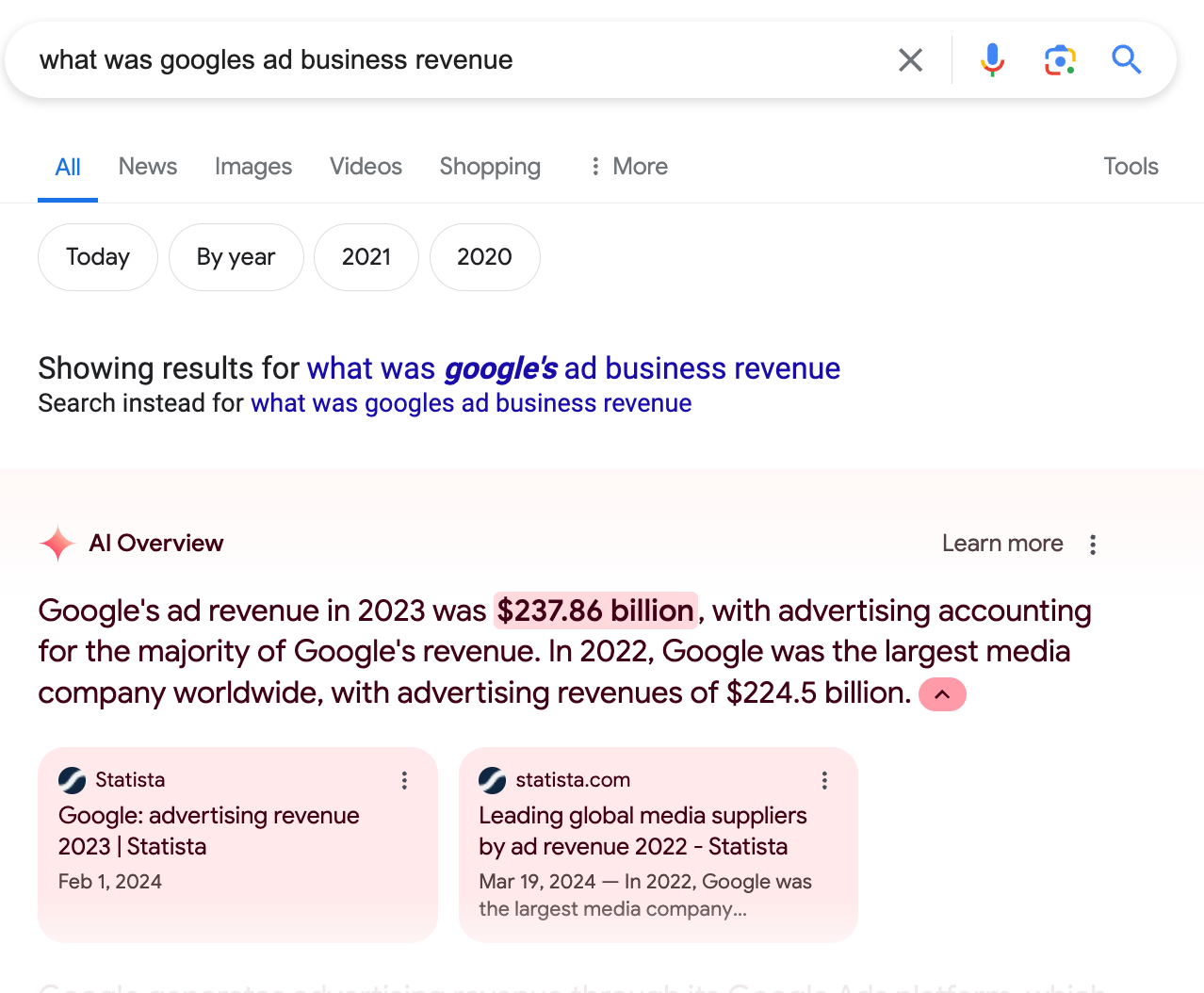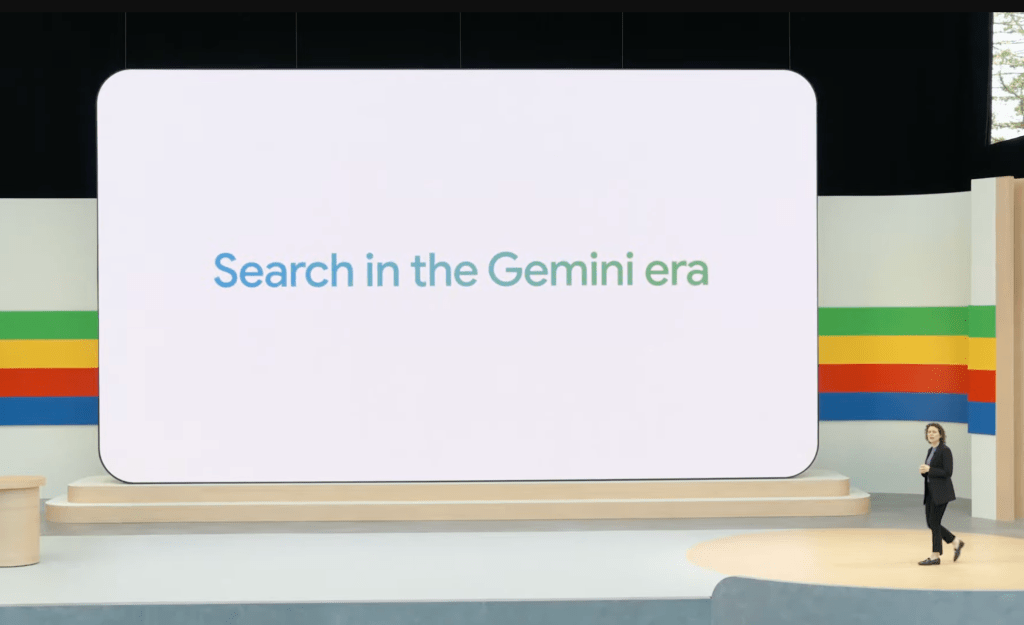Is SEO dead? Google I/O and the potential for a consolidated internet
In a flurry of tech announcements this week, Google's I/O conference, without saying it outright, signaled the potential consolidation of the internet as we know it
Hello from sunny NYC - writing this live from the West Side Highway. Taking today’s writing session to the outdoors to embrace the glorious few weeks that are “spring” before AC becomes a necessity and swampy heat hits the city.
This week was a busy one in the world of tech - most notably featuring OpenAI’s Spring update and Google I/O. While OpenAI’s announcements were nothing short of jaw-dropping, Google’s got me thinking a bit more. Today’s post likely will yield more questions than answers, but that’s representative of where I’m at with a lot of the aftermath from the announcement as only time will tell how this plays out.
Bringing AI to the front-page
Google I/O 2024 was a splashy AI-centric event that showcased plenty of new features coming to users this year. For our own sanity, we’re going to focus on one today - Google’s announcement of adding AI-powered overviews to its search results. Though subtle in its appearance, this update to Google’s search platform will most definitely affect what much of Google’s business is built upon - SEO and ad revenue. As I said, knowing the effects of this will take time and are up for debate, but today we’ll discuss potential implications of this update to their platform.

What does this mean for digital media, bloggers, and other businesses that rely on SEO to push traffic to their websites?
It’s crazy that a year ago, Bing AI announced their AI-powered search functionality. This Tuesday made it feel more real than ever that it’s not an if but a when will AI-powered functionality have an impact on traffic to web pages. A lot of us are scratching our heads and wondering - is an AI search engine actually the outcome we all want?
Google claims that the AI overviews resulted in users conducting more searches than without the technology “because they suddenly can ask questions that were too hard before,” said Liz Reid, who oversees the company’s search operations, while also declining to provide specific numbers to back the claims. I don’t buy that more searches means more clicks to web pages. More searches means more opportunities for AI to summarize the content you’re trying to see.
In order to maintain defensibility from the potential implications of AI dramatically reducing your web traffic, many bloggers are now moving to modes like Substack (how you’re reading this right now!), Beehiv, and other newsletter platforms as well as starting podcasts to start owning their audience and how they are able to engage with them. As always, the Hard Fork team had some good response to Google’s announcement on this week’s episode. It’s important to get a perspective from the journalists and reporters whose business will directly be impacted by these changes to Google.
What does this mean for Google’s ad business?
In Q1 2024, Google’s advertising business grew to $61.66B YOY, an increase from $54.55B YOY in Q1 2023. Google benefits more than anyone by having a robust advertising business. This means that Google should be incentivized to have traffic heading to websites where there ads are sitting, driving money back into their ads behemoth. So why would they release functionality that deters people from using those websites? It’s an open question in my mind, and one that points to the future of a consolidated internet, where even fewer are in the driver’s seat than there are today.
As Casey Newton said on this week’s Hard Fork, Google is ultimately able to pull the levers, swaying the traffic in the way that will yield the most positive outcome for them. The trickle down effects of this change to their site may be bigger than any of us are expecting.

How does this effect LLMs in the future, that have previously depended on text from the web to be trained on?
I’ve discussed Common Crawl before, but for a quick refresher, this free, open dataset contains over 250 billion pages spanning 17 years of web data. This data was the basis of many LLMs, including GPT-3. While a small percentage of this data may have been artificially generated, much of this data was written by humans, which is what made the LLMs trained upon this dataset feel more human in their responses.
It’s still unclear what the long term effects will be when more AI-generated content is fed into the training data of LLMs. Early research tells us things don’t look good. Researchers have discovered that when LLMs are trained on their own outputs, the model goes “MAD”, which stands for Model Autophagy Disorder. This basically means that a model “collapses” aka the model “loses information on the tails (the extremes) of the original data distribution, and starts outputting results that are more aligned with the mean representation of data”. In normal speak, models are becoming more generalized, and their responses are less varied across prompts. For this reason alone, we should be incentivized for the web to contain content primarily written majority by humans. So what does this mean for LLMs for the future? Yet another open ended question :)
Is SEO dead?
Every day when I swipe on Instagram, I get at least one ad or reel of someone pushing some SEO (search engine optimization) course that helps people improve the search rankings of their digital content. I’ve been seeing less and less of these, perhaps because my algorithm has learned that I’m not the target audience, but perhaps because SEO as we know it is changing dramatically.
Anyone creating content and publishing it on the web was once concerned with how highly their page would rank in a Google search and how SEO-friendly their content was. Now, they are in a frenzy, trying to optimize their content to be picked up by new AI features on sites like Google and Perplexity. Or they’re using AI to spin up hundreds of websites, making content for bespoke topics in order to drive more engagement to their site.
SEO will exist as long as the indexed web exists. Some food for thought for you readers is how long will the indexed web exist? Well what happens when we stop engaging with the web in the way we do now? In an agentic* future, in order to book a trip, you’ll ask your virtual travel agent and they’ll do all the browsing. You can ask a personal shopper to flag relevant purchases for your next vacation. When you need a question answered, Perplexity and Google will answer it in one shot. I believe we’re farther away from this future than the technology may lead us to believe, but I wouldn’t doubt if more people are using agents to navigate the web and get information than ever before in the next 5 years.
*An “agentic” future refers to a world in which software is able to take a task, break it down into steps, and complete them on behalf of a user, without the user ever participating in the intermediary steps. If you want more on that, Andrew Ng’s talk to Sequoia is a good watch. I’ve got a whole series on agents coming soon!
That’s it for existential questions… for now!
If you’ve made it this far through probably one of the most open-ended articles I’ve ever written, I appreciate you! Every now and then you’ve got to muse on the big, impossible to answer questions. I’d love to hear folks thoughts on what this all means for journalists, website owners, and you and me. Find me @gabyllorenzi on X. Thanks for reading!





Great breakdown of the many uncertainties facing the future of the internet. Looking forward to what you have to share on the agentic future